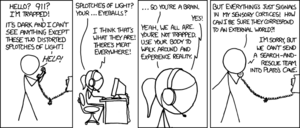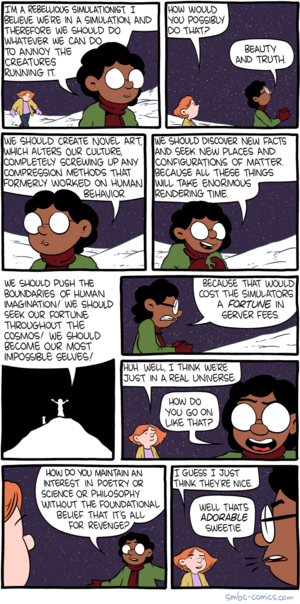Simulation hypothesis

Simulation hypothesis or, Simulation Theory is the idea that we may be living inside a simulation.
The sceptical hypothesis of simulation can be linked back to the time of the Indian philosophy of Maya (meaning illusion). In scientific history, the theory of simulation has long been a topic of debate. It is possible to draw comparisons between this hypothesis and established religious afterlife scenarios.
Simulationists[править]

A simulationist can be described as:
- One who designs or uses a simulation.
- One who believes in the theory of reality that humans are exist in a computationally designed reality or "simulation".[3]
Research[править]
At Code Conference 2016, Elon Musk famously said he believes we are living inside a simulation.[4]
Musk and the Bank of America are funding scientific research into determining whether we could be existing in such a simulation.[5]
Simulation Termination[править]
Peter Jenkins has the following to say in regards to Simulations and simulation termination;
"A future society will very likely have the technological ability and the motivation to create large numbers of completely realistic historical simulations and be able to overcome any ethical and legal obstacles to doing so. It is thus highly probable that we are a form of artificial intelligence inhabiting one of these simulations. To avoid stacking (i.e. simulations within simulations), the termination of these simulations is likely to be the point in history when the technology to create them first became widely available, (estimated to be 2050). Long range planning beyond this date would therefore be futile." [6]
The sentiments are somewhat echoed in a paper written by Robin Hanson who states;
"If you knew that you were a simulated person in this party simulation, and you wanted to live as long as possible, you might want to discourage anyone from leaving the party. If the simulation might end early were the future guest to become bored, you might also want to make sure everyone had a good time. And your motivation to save for retirement, or to help the poor in Ethiopia, might be muted by realizing that in your simulation, you will never retire and there is no Ethiopia."[7]
In Popular Culture[править]
Simulation hypothesis's most notable appearance in popular culture was in The Matrix as well as other appearances such as in Inception or Rick and Morty.[8] The Orion's Arm Universe Project uses the term 'Simulationism' to describe a range of religious and philosophical beliefs based around this premise.[9]
Exposition in the novel Accelerando by Charles Stross mentions an ancestor simulation project by the Church of Latter-Day Saints, with the stated goal of offering religious salvation. The goal later expands to simulate "all possible human minds."
A popular cautionary trope is simulation hell.
External Links[править]
- Elon Musk at Code Conference (YouTube)
- Are You Living in a Computer Simulation?
- Theory Theory Vs Simulation Theory (PDF)
- simulation-argument.com from Nick Bostrom
- Is Reality all just a Computer Simulation?
 /r/Simulate on Reddit
/r/Simulate on Reddit Simulation hypothesis on Wikipedia
Simulation hypothesis on Wikipedia
References[править]
- ↑ http://www.xkcd.com/876/
- ↑ https://www.smbc-comics.com/comic/simulationism
- ↑ Simulationist on Wiktionary
- ↑ Elon Musk Says We’re Probably Living in a Computer Simulation — Here’s the Science
- ↑ https://www.independent.co.uk/life-style/gadgets-and-tech/news/computer-simulation-world-matrix-scientists-elon-musk-artificial-intelligence-ai-a7347526.html?amp
- ↑ Historical Simulations - Motivational, Ethical and Legal Issues
- ↑ How To Live In A Simulation, Robin Hanson
- ↑ M. Night Shaym-Aliens!
- ↑ The belief that Reality is in fact a Simulation